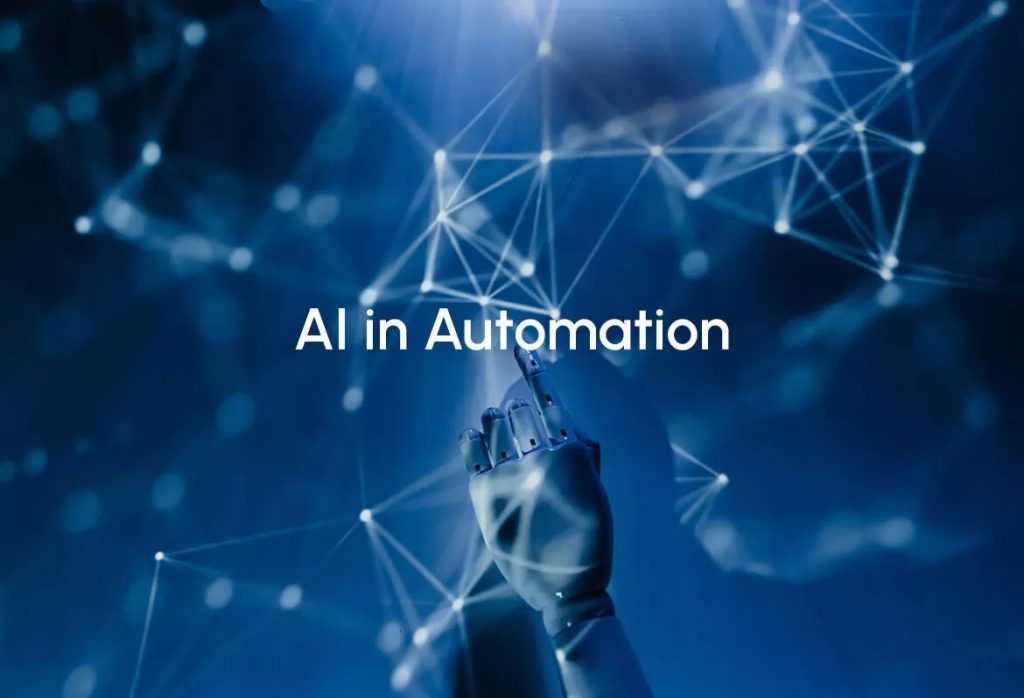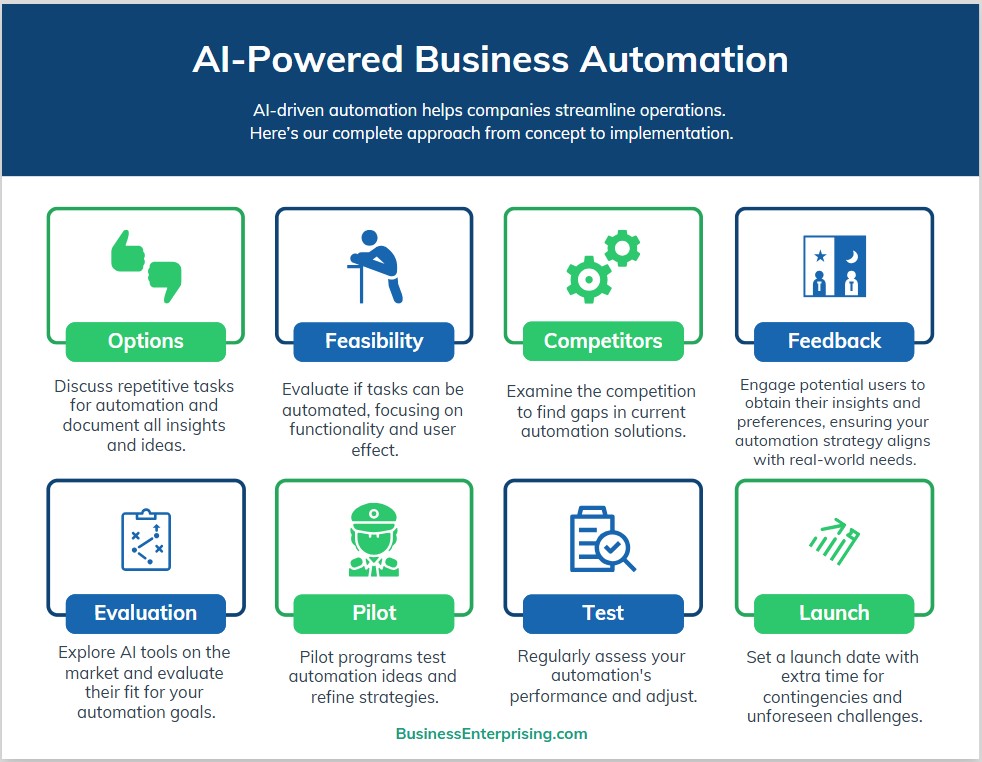
Automation powered by AI goes beyond traditional methods, offering flexibility and also adaptability to changing business needs. These technologies not only handle tasks faster but also provide insights to improve decision-making. As businesses face growing demands, adopting AI helps you stay competitive and productive.
Introducing AI into your operations may seem complex, but the benefits far outweigh the challenges. With careful planning and the right approach, you can integrate AI successfully. This guide will explore how AI for business automation can transform your work and prepare you for the future.
Understanding AI and Its Role in Business Automation
Artificial intelligence (AI) plays a significant role in transforming how businesses automate processes. It refers to systems that mimic human intelligence to perform tasks. These systems continuously improve based on data, making them highly adaptable. Unlike traditional automation tools, AI doesn’t follow static instructions. Instead, it learns from patterns and adapts to changing conditions.
Traditional automation relies on predefined workflows to handle repetitive tasks. It is rigid and struggles with variability. In contrast, AI for business automation uses machine learning and algorithms to make decisions in real time. It not only processes tasks faster but also identifies opportunities to streamline operations further.
AI’s significance lies in its ability to enhance your processes and decision-making. It reduces manual work, improves accuracy, and creates time for strategic thinking. For example, AI tools can analyze customer behavior to optimize marketing campaigns or predict demand trends to refine inventory management. By adopting AI for business automation, you gain a powerful tool to stay efficient and competitive.
Key Benefits Automation
AI for business automation offers substantial benefits that can transform your operations. One of the most impactful advantages is time and cost savings. AI-driven processes handle repetitive tasks quickly and consistently. This allows you to focus your resources on more strategic work. By automating routine functions, you can cut operational costs while improving speed and efficiency.
Another key benefit is the boost in efficiency and productivity. AI-powered tools can work around the clock without breaks or downtime. They analyze data, make decisions, and execute tasks faster than manual efforts. With fewer interruptions, your team can deliver results more effectively. This increased productivity helps you stay competitive in a fast-paced environment.
AI also reduces errors and improves accuracy in complex tasks. Unlike humans, AI systems don’t get tired or distracted. They process large amounts of data with precision. For example, AI can help identify errors in financial records or flag discrepancies in inventory management. This level of accuracy reduces risks and strengthens your operational reliability.
Scalability and flexibility are other significant benefits. AI solutions can easily adapt to your business’s growth or changing needs. Whether you’re managing a small team or a large enterprise, AI tools adjust seamlessly. This flexibility allows you to handle fluctuating demands without overhauling your processes. By using AI for business automation, you position your operations for long-term success while maintaining adaptability.
Popular Applications of AI in Business Automation
AI for business automation is transforming industries by streamlining processes and improving interactions. One of the most common applications is customer service. Chatbots and virtual assistants provide fast, accurate responses to customer queries. They operate 24/7 and handle multiple interactions simultaneously, reducing wait times. This improves customer satisfaction while lowering the need for human intervention in repetitive tasks.
Workflow automation in HR, finance, and supply chain management also benefits significantly from AI. AI tools simplify tasks like resume screening, payroll processing, and invoice management. In supply chains, they optimize inventory levels and track shipments in real time. These capabilities help you improve efficiency and reduce bottlenecks in daily operations.
Predictive analytics is another popular application that supports marketing and sales efforts. AI analyzes large volumes of data to identify trends and customer behaviors. With these insights, you can create targeted campaigns and anticipate future demand. Predictive analytics also helps your sales team focus on high-potential leads, increasing their effectiveness.
Robotic Process Automation (RPA) powered by AI goes beyond simple task automation. It combines machine learning with RPA to handle complex workflows and make intelligent decisions. This allows you to automate processes like document processing, data entry, and compliance checks. By implementing AI for business automation, you can achieve significant improvements in accuracy, productivity, and customer engagement across various departments.
Overcoming Challenges in Implementing AI for Automation
Implementing AI for business automation can bring challenges, but addressing them thoughtfully helps ensure success. Data privacy and security concerns are common barriers. AI systems rely on large amounts of data, which can raise questions about confidentiality. You can address these concerns by adopting robust encryption methods and clear data governance policies. Transparency about how data is used also builds trust among stakeholders.
Managing costs and allocating resources effectively is another challenge. AI adoption requires upfront investment in technology and training. You can mitigate this by starting with small-scale projects that demonstrate value. Gradually scaling efforts allows you to manage expenses while achieving measurable results. This approach also reduces the risk of overcommitting resources before understanding the return on investment.
Resistance to change within teams can slow implementation. Employees may worry about job security or struggle with adapting to new tools. Address these concerns by involving your team early in the process. Offer training sessions and also highlight how AI supports their work rather than replacing it. Open communication fosters a sense of collaboration and reduces uncertainty.
Proper integration with existing systems is critical to maximizing AI’s potential. Mismatched technologies can lead to inefficiencies or data silos. To avoid this, evaluate your current infrastructure and choose compatible AI solutions. Partnering with experienced vendors can also streamline the integration process. By proactively addressing these challenges, you can harness the benefits of AI for business automation while minimizing disruptions.
How to Get Started with AI for Business Automation
Getting started with AI for business automation begins with assessing your needs and identifying opportunities for improvement. Analyze your current workflows and look for repetitive or time-consuming tasks. These areas often benefit the most from automation. Involving key team members in this process helps you uncover gaps and set clear goals.
Selecting the right AI tools and platforms is the next step. You’ll want to choose technologies that align with your specific requirements. Consider factors like scalability, compatibility with existing systems, and ease of use. Researching vendors and consulting industry experts can help you make informed decisions. Starting with tools that offer flexibility allows you to adapt as your needs evolve.
Training and upskilling your employees is essential to a successful implementation. AI adoption often introduces new workflows and technologies that require a learning curve. Providing your team with proper resources as well as ongoing support builds confidence. Employees who understand how AI enhances their roles are more likely to embrace the changes.
Developing a phased approach to AI implementation helps reduce risks and also manage resources effectively. Begin with a pilot project to test its impact on a specific area of your business. Use the results to refine your strategy before expanding. This method minimizes disruptions and allows you to scale with confidence. By following these steps, you can integrate AI for business automation smoothly and achieve meaningful results over time.
Future Trends and Opportunities in AI-Driven Business Automation
AI for business automation is evolving rapidly, with emerging technologies driving innovation. Machine learning, natural language processing, and computer vision continue to expand automation capabilities. These advancements allow businesses to tackle more complex tasks and gain deeper insights. As these technologies improve, they open new possibilities for efficiency and growth across industries.
Industry-specific use cases highlight how businesses are leveraging AI. In healthcare, AI automates patient record management and streamlines diagnostic workflows. Retailers use AI to personalize customer experiences and optimize inventory. Meanwhile, in manufacturing, predictive maintenance systems minimize downtime and also improve productivity. These examples show how AI is shaping diverse industries with tailored solutions.
AI will also reshape the future of work and business models. Automated systems will handle more repetitive tasks, freeing employees to focus on creative and strategic initiatives. Hybrid teams of humans and AI will become common, blending efficiency with human judgment. Businesses that adapt to these shifts will remain competitive and innovative in a changing market.
Ethical AI and sustainable practices are becoming more important as adoption grows. Transparent algorithms as well as fair decision-making processes build trust and reduce biases. AI tools are also being designed with sustainability in mind, optimizing energy usage and reducing waste. By embracing these practices, you can ensure your use of AI for business automation aligns with broader goals for social and environmental responsibility.
Conclusion
AI for business automation offers an incredible opportunity to transform how you work. By automating tasks, you can save time and reduce costs. It enables your team to focus on innovation and strategic growth. With careful planning and also the right tools, you can integrate AI smoothly into your operations.
As AI technologies advance, businesses will gain new ways to optimize processes and deliver value. Staying proactive and adaptable allows you to capitalize on these developments. By addressing challenges like data security as well as team readiness, you set the stage for long-term success.
Adopting AI for business automation is not just about improving efficiency. It’s also about preparing your business for the future. By embracing these tools responsibly and strategically, you can build a foundation for sustained growth and innovation.



